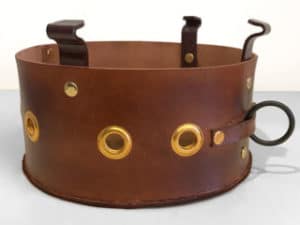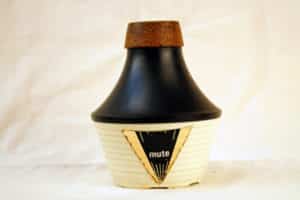Stage fright and performance anxiety are common in everyone, but a dry mouth can cause more issues for trumpet players than for pianists. Let’s look at what can help you get over your stage fright when performing in public and how you can prevent a dreaded dry mouth.
1. Practice Makes Perfect
This one is obvious tip against stage fright, but if you’ve practiced hard and effectively, you know what you’re doing and this will decrease your fear of the performance and boost your confidence.
We’ve all heard the suggestion to imagine the audience isn’t there while you’re playing (or imagine them in your underwear!), but rather than that, imagine the audience is there while you practice. Imagine your practice is the real thing, so your actual performance will be just another serious practice.

If you find it difficult to practice for fear of having your family judge you or your neighbors complain, consider buying a practice mute or Silent Brass system to practice quietly as much as you like.
2. Have A Banana
Bananas are a natural source of beta blockers, which in turn are an active ingredient in anxiety medication. Beta blockers block adrenaline and slow your heart rate – which is what you want if you’re so nervous your heart is beating out of your chest!
If you know you have to perform in front of an audience or give an audition, consider eating a banana about an hour before. This might calm you down naturally and make you feel a little less anxious.
3. Perform Often (Exposure Therapy)
One reason why people feel anxious about performing is that it’s not a usual occurrence. It’s an unusual situation and it pushes you out of your comfort zone.
A good way to deal with it is a form of exposure therapy – the more often you’re exposed to what you’re afraid of, the more you’ll realize it’s not so bad.
Think of a teacher on their first day, alone in front of 20 or 30 students. Sure, they’ll be nervous. They’re afraid they’ll mess up or embarrass themselves. That same teacher 5 years later? Giving a lesson is just another day at the office.
Same with playing the trumpet: the more you perform, the easier it will get. Join a group that performs in front of small crowds, or start by playing in front of friends or family. Expose your playing to other people and you will quickly realize that they won’t judge you and you’re not making a fool of yourself.

4. Stay Hydrated
If you get a dry mouth before or during your performance, drink water. This sounds obvious, but rather than drink water when your mouth gets dry, drink plenty of water during the day and stay hydrated in general.
Some people report good results with adding a little bit of lemon to their water to stimulate their saliva production. Seltzer water is also supposed to help. Try it out and see if it works for you.
5. Use Chap Stick
If you find your lips and mouth get very dry as you play, limiting your endurance and range, consider using chap stick regularly. An alternative to chap stick is vaseline, or if you’re feeling spendy, have a look at Robinson’s Remedies Lip Renew recovery stick*. It’s wax-free and won’t leave a residue on your lips (and therefore your instrument), but it’s not cheap.
6. Salivate
Dry mouth is a lack of saliva in your mouth, so what you need to do is – start salivating. This is easier said than done, but things that help you salivate are:
- lightly biting the side of your tongue with your teeth
- brushing your tongue against your teeth repeatedly
- keep a picture of delicious food nearby to look at during breaks.
The last tip comes from Reddit where a user suggested looking at pictures of delicious food to get your saliva going. Genius!
7. Remember That Nobody Is Perfect
People get nervous because they don’t want to fail, they don’t want to feel embarrassed if they make mistakes. Does that sound like you?
Just remember, even great players have off days, even trumpet legends play wrong notes at times. Great artists mess up and move on. Even prolific performers like Ani DiFranco mess up, and the songs where she messes up, forgets a verse, accidentally repeats a verse, are some of my favorites. The Corrs have an unplugged DVD out where they mess up the very last chord of one song. They joke about it, they move on.
Practice as much as you can, prepare thoroughly, and go out there with your head high. Know that if you do play badly, people will think you’re simply a good player having a bad day.
Looking for a teacher?
Want to get lessons at the comfort of your own home? Check out the course Learn to Play the Trumpet: Beginner to Pro Made the Easy Way* on Udemy! (See their full trumpet course line-up here*!)
8. Focus On The Music
It’s easy to focus on yourself when you’re playing, on how nervous you are and what people will think of you. But people are there for the music, and music is what you should focus on.
Barry Green talks about this in his book The Inner Game Of Music*. It gives exercises and has new ideas about how to learn music differently and how to get out of your head and focus on the music.
9. Medication
If your anxiety is still overwhelming and you start shaking or feeling nauseous, you could talk to your doctor about getting a prescription for beta blockers. Keep in mind though that performance anxiety is a symptom – it’s better to treat the root cause.
I hope these tips will help you with your performance anxiety and on your way to become a more confident performer. Good luck!
Related Articles:
- The 5 Worst Things When it Comes to Playing a Trumpet (and How to Avoid Them!)
- Top 3 Trumpet Maintenance Tips
- How to Fix Sticky Trumpet Valves & Other Common Problems
- 11 Famous Songs with Great Trumpet Parts
- The Best Trumpet Bucket Mutes (Buying Guide)
- Fascinating Trumpeter’s Trivia – Frequent Questions Answered
TrumpetHub.com is a participant of the Amazon Services LLC Associates Program, an affiliate advertising program. Links marked with an asterisk (*) are affiliate links. If you buy a product through an affiliate link, we will get a small commission without extra cost to you. This helps us earn an income off the free content we provide to you. Thank you for your support!



